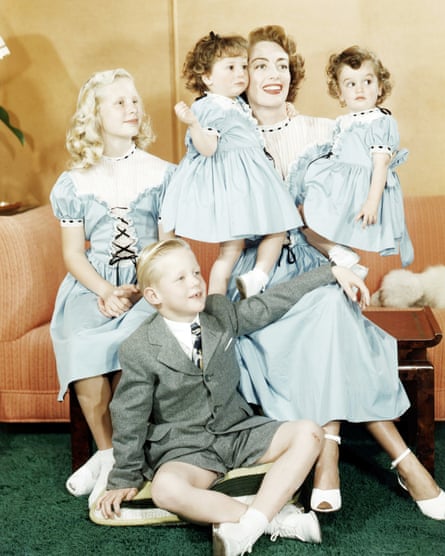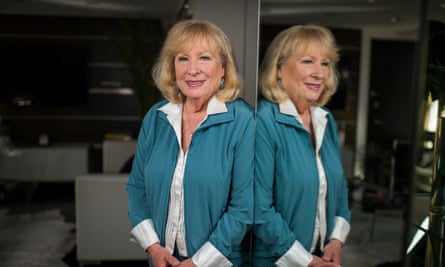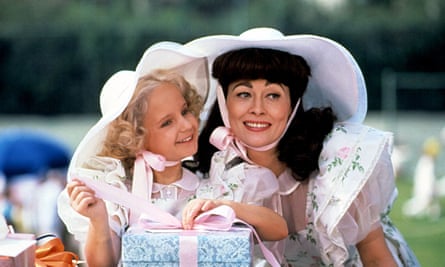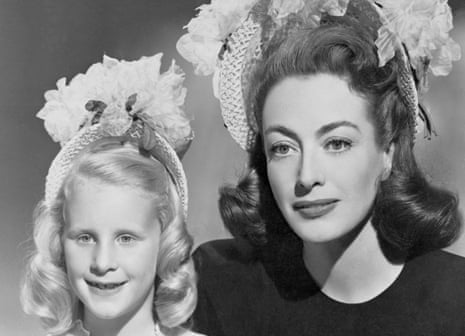It is Christina Crawford’s 80th birthday on the day we meet, and she is energetic after an opening night. A couple of days earlier, Mommie Dearest, the musical based on her blockbuster 1978 memoir of the same name, had a run-through at Birdland, the renowned New York jazz venue, and she is hoping the show will find backing for a full production. “It was sold out, it was fabulous,” she says, looking glamorous and spry, before issuing what has become a standard warning: “The musical had absolutely nothing to do with the movie. I want to put that in big capital letters.”
The movie she is referring to is, of course, the 1981 adaptation of Christina’s memoir that starred Faye Dunaway as Joan Crawford, Christina’s adoptive mother, whose abuses, soberly detailed in the book, were turned by the movie into high camp. As chronicled in Mommie Dearest, Crawford slapped, kicked, punched and tried to strangle her daughter, while subjecting her to a severe schedule of cleaning and other household chores, driven by the movie star’s alcoholism and who knows what else. “We didn’t have a language for it,” says Christina. “We didn’t have laws for it. We didn’t have a social context for it, and we had shame. A tremendous amount of shame, coupled with fear. It wasn’t easy.” She laughs at the understatement. The publication of Mommie Dearest, perhaps the first memoir ever to document child abuse from the point of view of the child, changed the landscape of victim representation and was an early precursor to today’s more robust state of victims’ rights. “I’m not a martyr, but I think, looking back, it is truly amazing to me what one person can do.”
It was all a long time ago. Crawford adopted Christina in 1940, and died of a heart attack in 1977. Christina’s younger brother, Christopher, died of cancer in 2006. Lingering interest in the story hinges on enduring fascination with the glamour of that Hollywood era and on the particular contradictions of Crawford. In the context of #MeToo, the story has renewed resonance, and Christina is an interesting case study in the long-range effects of abuse as she tacks between cheerfully declaring herself free from the fallout of her childhood, and testifying to how hard that exorcism has been.

She wrote the musical to explicate more fully her relationship with her brother, Christopher – “how the siblings grow up through the abuse to survive in the real world, with very little going for them except their own love of each other and the will to live”. Long before the term “gaslighting” became mainstream, they were vital as each other’s witness; without Christopher, Christina believes, she wouldn’t have survived. At this many years’ remove, I’m curious as to whether the toxicity of the material continues to have any power over her.
“I don’t know that you ever control it,” she says. “But you come to terms with it. I honestly don’t think it controls me any more. It is something that you have to live through, and it’s very difficult, because there’s no roadmap for it, even today. Generally speaking, we don’t recognise the long-term psychological damage that is inflicted on people who are abused, neglected and trafficked. It is hard for people to understand that what happened 20 years ago is creating behaviour patterns today.” At the show, a man sitting next to Christina introduced himself to her as the psychiatrist at Rikers Island, the notorious New York prison – “coming to our show to learn about post-traumatic stress disorder. I thought this was fantastic.”
Christina’s own survival was something she achieved almost entirely without the help of outside agencies. In the US, child protection laws were introduced from the 1960s, and the Child Abuse Prevention and Treatment Act, creating a single federal focus for preventing and responding to child abuse and neglect, didn’t come into effect until in 1974. Growing up in Hollywood in the 40s and early 50s, Christina had no recourse to the authorities. In fact, after a particularly violent episode she characterises as her mother “trying to kill me”, it was Crawford herself who called the police and asked them to arrest her daughter for delinquency. “I was 13 or 14. And it was then that I realised the world had gone insane. The officer was very kind. He told me that there was nothing he could do because there were no laws to protect me. He told me: ‘You have to try to live [here] until you are 18 and can go free. But, otherwise, if anyone calls me again on you, you’ll have to go to juvenile detention.’”
These days, I suggest, Crawford would have been given a diagnosis. Christina looks fiercely indignant. “She would have been in jail! She would’ve been hauled off to jail for attempted murder. What is the excuse for that? There’s no excuse. It doesn’t matter. It doesn’t matter. It doesn’t matter. That’s not the issue. And that’s not my responsibility, anyway.”
The laws changed, and children became better protected. Christina started to get some distance on her childhood. After being sent, at the age of 10, to boarding school, she understood that the rules she grew up under weren’t normal. She tried to build a degree of self-esteem after years of being told by her mother that she was useless. There was no real therapeutic language at her disposal and no framework for recovery. “It was day by day. I had some teachers, I had some coaches. I had education, which I adored. For me, education was always the path forward and that’s what I used. It has to do with how much you want to be well. Do you want to be free? And some people fail; they just are not strong enough. A lot of them are dead. And a lot of them are in jail.”

She was helped, rather perversely, by a fear of being incarcerated that grew out of her mother’s constant threats to have her put away. “I had a terror of being locked up. How could I not? And my terror of being locked up I think kept me on the straight and narrow.”
Fear is the water that abused children swim in, Christina says. “Because you don’t know what’s going to happen and your life is so chaotic. But on the other side of the equation, it’s fear from people who are afraid to speak up. Fear that they’re going to lose their job or that people are going to say something bad about them. If you were to ask me about one thing that embraces all of us, it’s the constant fear.”
This was precisely her experience. When she was a child, housekeepers, secretaries, nannies and teachers were aware of what was happening, but no one who knew spoke up. After the book came out in 1978, stars of Crawford’s vintage lined up to defend her, as did former members of her household. It was a generational closing of the ranks over what appeared, to Crawford’s contemporaries, to be a piece of monstrous impertinence. Christina laughs very loudly at this. “Well, yes, I think it was! To say the least!”
Christina didn’t originally intend to write a tell-all. In her early 20s, she worked as an actor before enrolling on a degree course at UCLA and going on to gain a master’s at the University of Southern California. She would later work in corporate communications. After a period of estrangement in the latter years of her mother’s life, she attempted a reconciliation. Did she think the rapprochement was real?
“I thought it was,” she says. “But it turned out not to have been. No, towards the end, she didn’t have any work. She was an alcoholic. She was ill. She was drug-addicted. And I think she just wasn’t playing with a full deck. And as soon as I left New York to go back to California to work, I completely lost context – not contact, but context with her, because I wasn’t physically present. Then she died.”
In spite of the apparent reconciliation, Christina and Christopher were cut out of the will, for what Crawford cited as “reasons which are well known to them”. Christina was so furious she went straight to her desk and started writing down everything that had happened in her childhood.
The book sold more than a million copies and suffered an enormous pushback from contemporaries of Crawford’s. It was gaslighting, pure and simple, but Christina wasn’t surprised. “No, I understood Hollywood,” she says with a laugh. “I knew where they were coming from – they were guilty of seeing and not saying. It was blaming the messenger for the bad news. Most of them are dead now; I have outlived all of them! And I never replied to any of them, or responded. I simply stuck to the message that I knew to be the truth.”

Her two younger siblings disputed the book, too, not unusual in an abusive family. “Different people in the family experience the parenting situation in different ways. Because the parenting situation is different towards them, and that’s a divide-and-conquer type of situation.”
Christopher, in spite of his desire for privacy, remained wholly supportive, she says, and she received thousands of letters “from people all over the world who had never heard somebody speak up on their behalf before. And that took me forward on a wave of faith.”
The ripple effect is still being felt. “Look at Michigan State, with the gymnasts. Look at Ohio State, with the athletes. Look at Penn State [where the abusive football coach, Jerry Sandusky, was convicted of 45 counts of child sexual abuse]. This is right now.” Even with hashtags exhorting people to believe victims, the law still lags and there is a big caveat around domestic abuse, about which people have a tendency to say “who knows what really happened”, says Christina. If she could change one law, it would be the statute of limitations. “When you have a statute of limitations against sexual abuse of children, then most of the perpetrators go free because some states only have three years. Some have 10. Maybe some have 20. But if it happens to children, then by the time they get old enough to speak out, or to understand what happened to them, the statute of limitations has been reached. And that’s all about protecting the perpetrator.”
In 1981, Christina had a debilitating stroke, underwent a five-year long recovery and, for the past 25 years, has lived in rural Idaho, writing a series of follow-ups to Mommie Dearest. I hope her musical finds a backer. It is a timely story, and the focus on her relationship with Christopher is very touching.
The fear doesn’t go away when the abuser dies. “No,” she says quietly. “Because it’s internal.” With time, and work, however, it lessens. Now, when Christina unexpectedly sees a photo of her mother, she has no reaction. “Nothing. No.”
Is it indifference?
“No. It’s just … acceptance.” Can she still be ambushed by responses laid down in her childhood: the fight or flight, hardwired in her brain?
“No, I don’t think so. Not any more.” She smiles. “It has been a long time.”
